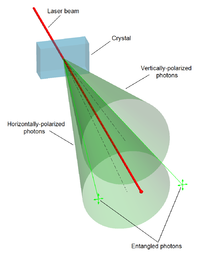
Photo from wikipedia
Entanglement swapping is gaining widespread attention due to its application in entanglement distribution among different parts of quantum appliances. We investigate the entanglement swapping for pure and noisy systems, and… Click to show full abstract
Entanglement swapping is gaining widespread attention due to its application in entanglement distribution among different parts of quantum appliances. We investigate the entanglement swapping for pure and noisy systems, and argue different entanglement quantifiers for quantum states. We explore the relationship between the entanglement of initial states and the average entanglement of final states in terms of concurrence and negativity. We find that if initial quantum states are maximally entangled and we make measurements in the Bell basis, then average concurrence and average negativity of final states give similar results. In this case, we simply obtain the average concurrence (average negativity) of the final states by taking the product of concurrences (negativities) of the initial states. However, the measurement in non-maximally entangled basis during entanglement swapping degrades the average swapped entanglement. Further, the product of the entanglement of the initial mixed states provides an upper bound to the average swapped entanglement of final states obtained after entanglement swapping. The negativity work well for weak entangled noisy states but concurrence gives better results for relatively strong entanglement regimes. We also discuss how successfully the output state can be used as a channel for the teleportation of an unknown qubit.
Journal Title: Entropy
Year Published: 2022
Link to full text (if available)
Share on Social Media: Sign Up to like & get
recommendations!